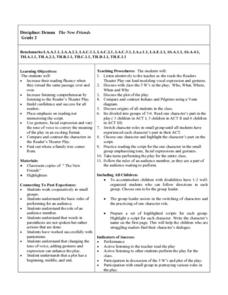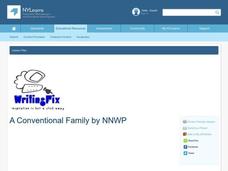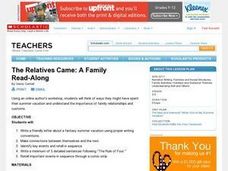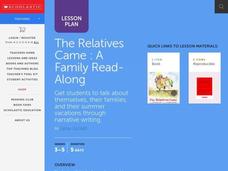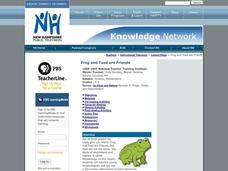Houghton Mifflin Harcourt
Family and Friends: English Language Development Lessons (Theme 4)
Family and Friends is the theme of a unit consisting of English language development lessons. Reinforce language proficiency, particularly in family vocabulary, basic needs, feelings, short vowel sounds, blending, reading high frequency...
Houghton Mifflin Harcourt
Family and Friends: Extra Support Lessons (Theme 4)
Family and Friends is the theme of a unit offering extra support lessons. Follow each lesson plan's teach, blend, guided practice or practice/apply routine to reinforce concepts such as clusters, responding to reading, drawing...
Curated OER
Parts of a Friendly Letter
The art of writing a letter has not been lost to email and texting! Teach kids how to format a friendly letter with a presentation about the parts of a letter, as well as prompting them to write a letter about their favorite holiday.
Curated OER
Family And Friends
Middle schoolers explore and practice how to answer question forms and to use key vocabulary about family and friends. They assess how to find out more about each other's friends and families by completing a worksheet full of questions...
Curated OER
Drama: The New Friends
Reader's Theater is a great way to build fluency, intonation, and dramatic flare. The class reads the theater piece, "The New Friends" paying attention to how they express emotion and feeling as they read. They discuss the use of plot,...
Curated OER
Writing a Friendly Letter
Elementary schoolers write a friendly letter. For this letter writing lesson interrogative and declarative sentences in their friendly letter. The students write to an intended audience.
Houghton Mifflin Harcourt
Special Friends: English Language Development Lessons (Theme 9)
Enhance language proficiency with a Special Friends themed English language development unit. Each lesson follows a listen, speak, move, and/or look routine that is guaranteed to get your scholars discussing topics such as animal...
Curated OER
The Family Tree
Learners make a family tree. In this family lesson, students brainstorm what the word family means, interview their family members and grandparents, create a family tree, list their family's favorite foods and write an essay describing...
Curated OER
All About Me, My Family and Friends
Pupils use general skills and strategies of the writing process to show their role in their family, school, friendships, the community and the world. They demonstrate their self-motivation and increasing responsibility for their own...
Curated OER
ASL Lesson 4
Provide your hearing-impaired or special-needs learners with a functional ASL vocabulary focused on feelings and family. Lesson 4 in this extensive series allows you to view both images and videos of each word or sentence as it is...
Curated OER
A Conventional Family
Students explore writing techniques by analyzing their own families. In this family values instructional activity, students view the film "The Incredibles" in class and discuss the different types of modern-day families. Students write...
Curated OER
The Relatives Came Family Read-Along
Third graders brainstorm on what they believe they do on their summer vacation. They explore how family and relatives are important in their lives. They read along with their teacher a book about relatives.
Curated OER
Family Traditions
Students research their family traditions. They select a tradition that has meaning to them and write about the traditions. They retell the story to a partner and add details. They write a draft of their story to a partner and...
Curated OER
Helping Hand
Young scholars discover ways to help others. They share ways they help their family and friends. Afterward, students trace hand prints on paper and then draw pictures and words to explain how the hands can be used to help other people....
K20 LEARN
Friends, Romans, Countrymen, Lend Me Your Emotions: Julius Caesar
Scholars, high schoolers, class members! With the help of this instructional activity, you too can identify the three persuasive appeals (ethos, pathos, and logos) the characters in William Shakespeare's tragedy Julius Caesar...
Curated OER
A Ghost in the Family
In this reading worksheet, students answer 10 multiple-choice questions about the book. For example, "Who did Chad and Jeannie visit?"
Curated OER
The Relatives Came: A Family Read-Along
Students read the book, 'The Relatives Came' by Cynthia Rylant to revive memories about their own summer vacations and family customs. They write a friendly letter about a fantasy summer vacation--"What I Wish I Did on My Summer...
Curated OER
Mark´s Family
In this family members worksheet, students complete multiple choice questions about labeling family members, complete a word search and filing in the blanks to sentences. Students complete 3 activities.
Curated OER
Writing a Friendly Letter
Young scholars write a friendly letter using the four standard sentence. In this friendly letter lesson plan, students use correct sentence structure and punctuation in pairs.
Curated OER
Family- Who Am I?
In this ESL vocabulary building worksheet, students examine 7 pictures of family members and read the clue. Students select the correct answer from 4 choices. Example: My auntie's son is my ...(cousin).
Curated OER
Frog and Toad are Friends
Students view a 30-minute video lesson to discover information about the characteristics of frogs and toads. They then transform themselves into frogs and participate in a Jumping Frog Jubilee. They work in groups of three to measure and...
Curated OER
Let's Learn About Patricia Polacco: An Author Study
Students participate in an author study about Patricia Polacco focusing on her use of family and friendship as themes in her books. They write a letter to the author and compare her life to that of Beatrix Potter. They examine how their...
Curated OER
Author Study of Patricia Polacco's Family Stories
Students describe factors that influence relationships with family and friends.
Curated OER
My Family and Me: Our Similarities and Differences
Students are introduced to basic genetic information to discover how they acquired the traits they have. Individually, they develop a family tree and identify the similarities and differences between two poeple. In groups, they examine...






